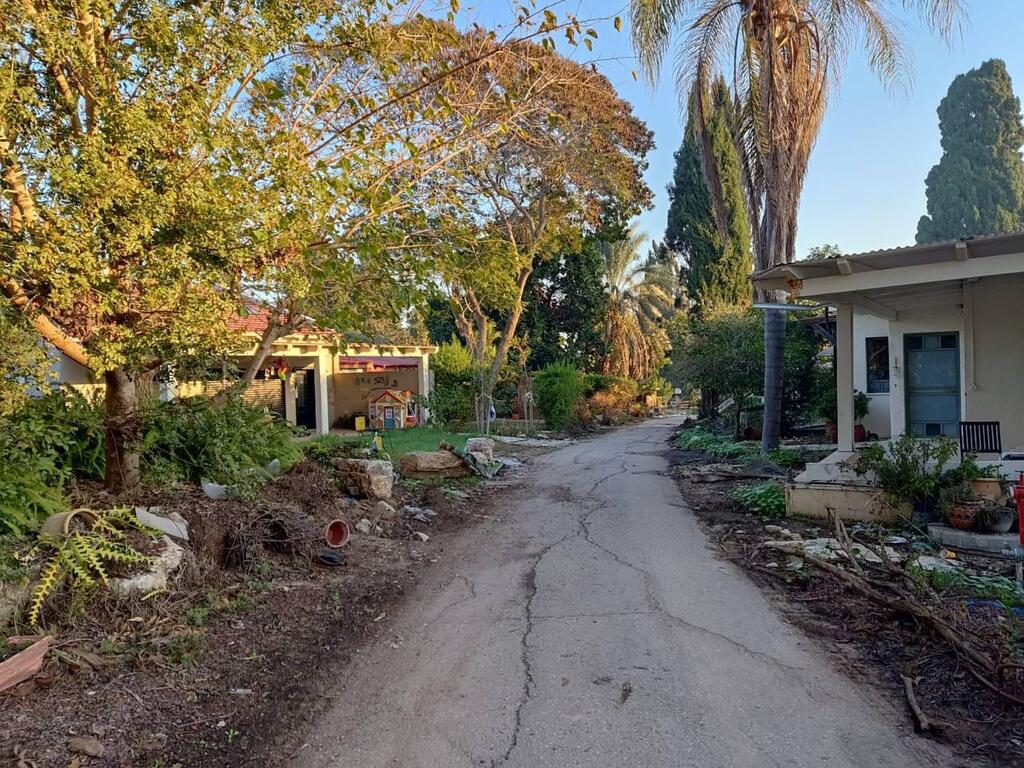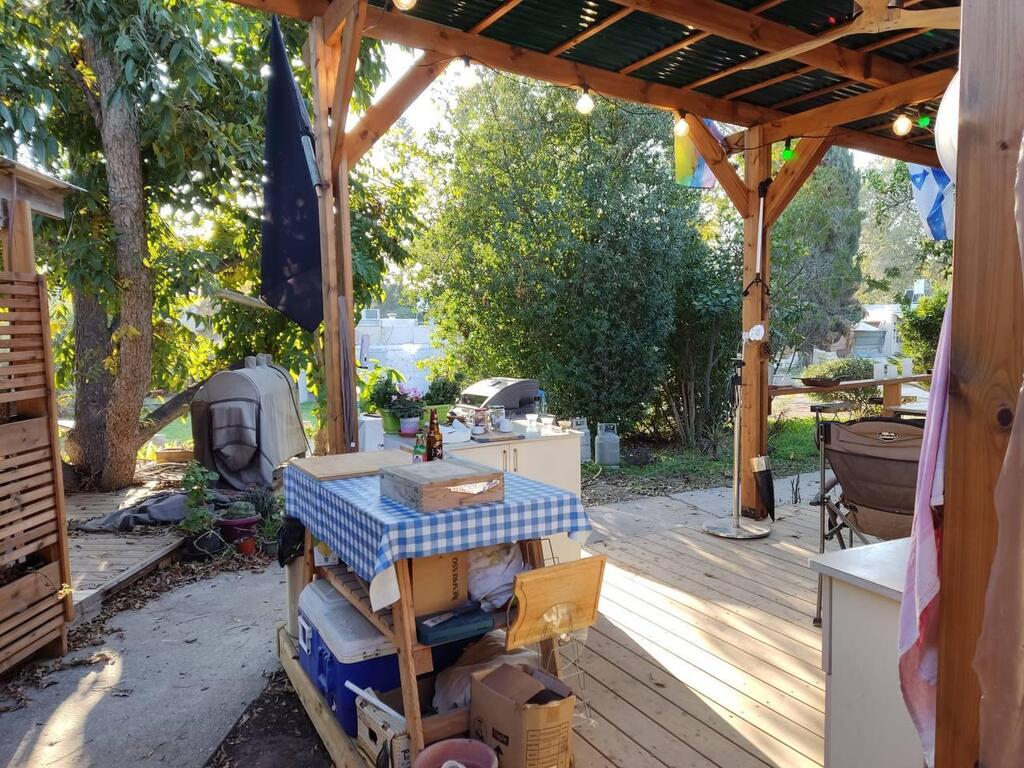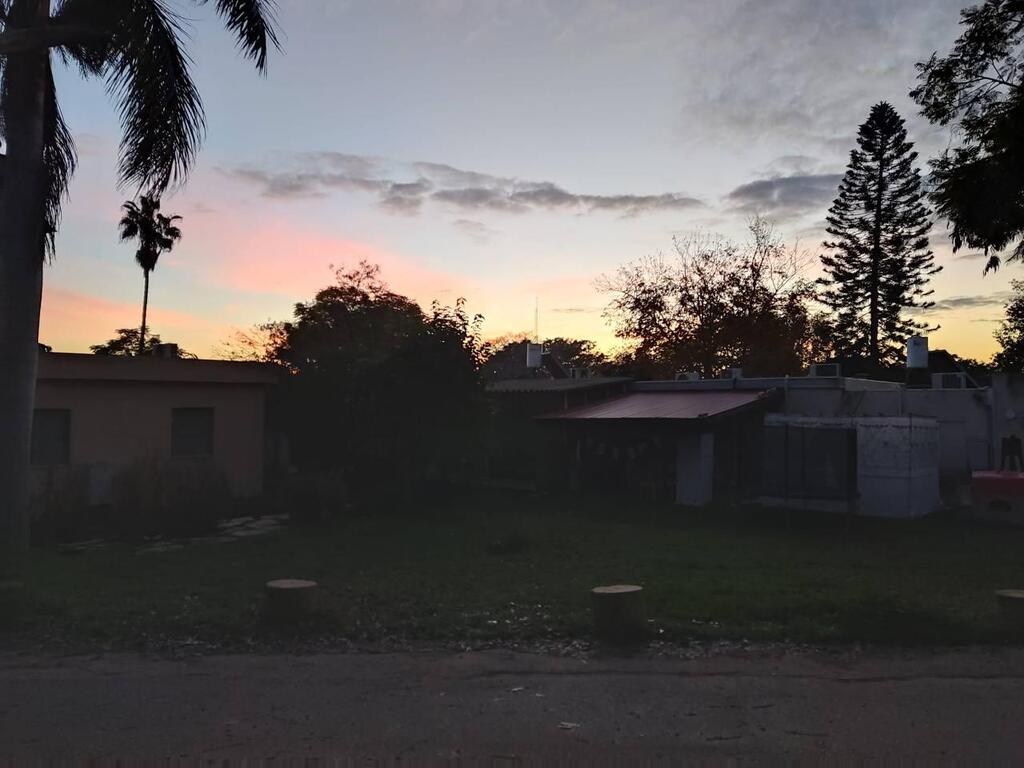Getting your Trinity Audio player ready...
Three months after the October 7 massacre, Kibbutz Kfar Aza bustles with life most of the day. Soldiers with weapons at the ready, groups of tourists who receive guided tours, police officers who come to hear the stories of heroism, and most recently even officials who are planning the restoration of the kibbutz.
More stories:
However, in the absence of street lighting or light in the abandoned houses, the darkness here is absolute. Only one house, at the highest point in the kibbutz, is illuminated by a strong garland light. This is the house of Ayelet Cohen, 55, and Shahar Schnurman, 62.
7 View gallery
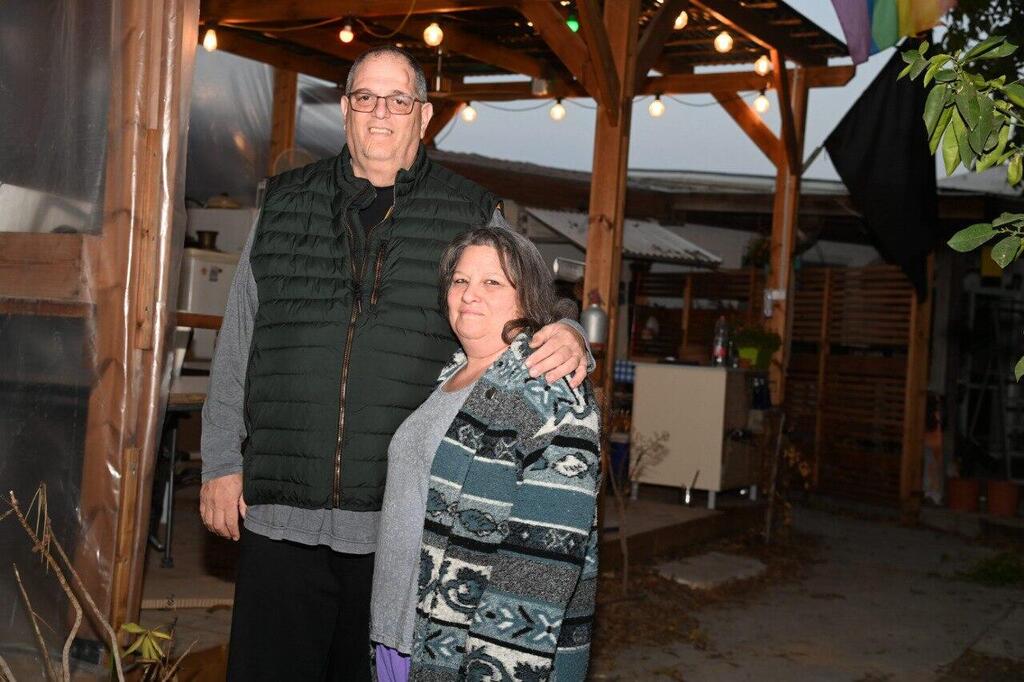

Shahar Schnurman and Ayelet Cohen are the only current residents of Kfar Aza
(Photo: Hertzel Yosef)
Despite the government's efforts to return some of the residents of Gaza border towns to their homes, excluding the kibbutzim near the fence, Ayelet and Shahar are the only couple who returned to live in Kibbutz Kfar Aza, one of the closest to the fence, which suffered a very heavy blow on October 7.
'The noise is no different than it was in 2014'
About three weeks ago, Ayelet and Shahar informed the head of security of the kibbutz that they were returning home. "I didn't ask the army, but the army knows we are here, because once a week we host everyone in the kibbutz for a barbecue, whoever comes is welcome."
"Some tell us well done, but some say we've gone crazy. I can't disagree with them," Schnurman said with a smile. "But I don't ask what their opinion is. Everyone will have to make their own decisions. I don't ask and I don't recommend, I just live here."
Is there fear?
"When the evening falls and it's completely dark, it's not pleasant to walk outside. But inside the house, it's warm and cozy, and I sleep better here than I've slept anywhere else. In Tel Aviv there's car noise. Here it's no different than it was in 2014. The kibbutz is destroyed, but in terms of the noise, the echoes of the explosions from Gaza is music we know."
The music of Kfar Aza accompanied Cohen most of her life, and it was not always so jarring. "I was born here when the kibbutz was 10 years old. The proximity to the border and the distance from the center or a big city made the kibbutz very united. They say it takes an entire village to raise a child so we were the children of the village. There was a lot of pleasant intimacy, I really liked growing up here."
"They put a lot of thought into building the neighborhoods, that there would be space between the houses with room for grass. To see it, you have to go to a certain point in the kibbutz. We happen to live in a neighborhood that is close to the fence, so it's right next to the house. But those who come to the large piazza in the center of the kibbutz don't feel Gaza. In any case, when you live here you get used to it."
As a child, she remembers trips to Gaza. "We did a lot of shopping there. Once a week we went to the sea through Gaza. We didn't go with soldiers or with weapons. We grew up with Gaza, not as a very scary and threatening place."
The good memories from her childhood were also the ones that helped her decide to build the house in the kibbutz. "I brought Shahar to the kibbutz. When I met him I was living in Tel Aviv and when we became a couple we decided to leave the city. At some point I said I wanted to return to the Negev, this was after the disengagement from Gaza. Kfar Aza was a good solution, because it wanted us. They found Shahar a job in a factory, I opened a massage and acupuncture clinic, and since then I haven't regretted it for a moment."
'We felt forsaken'
In Hamas' surprise attack, the couple stayed for more than a day inside the bomb shelter. "When the chaos started, at 6:30 in the morning, we entered the shelter. Except for short bathroom breaks or trying to see what was going on, we did not leave for 30 hours," said Schnurman. "Pretty soon we realized what was happening. On one of my breaks, I saw terrorists inside the kibbutz, and I also went looking for someone at the request of her husband, and found her in her home after she was murdered."
"In the beginning, we still had a TV, but then the electricity went out. We received the information through WhatsApp contacts who told us what was happening. At some point we needed to save battery power so we stopped updating. I told my sister to only talk to me when there was good news so I didn't hear from her again. A terrible thing happened here, we felt that we were abandoned. We were sitting here without electricity, without water, as far as we were concerned, the end of the world has come and we were sitting in some dark cave, who knew if we will ever get out of it."
7 View gallery
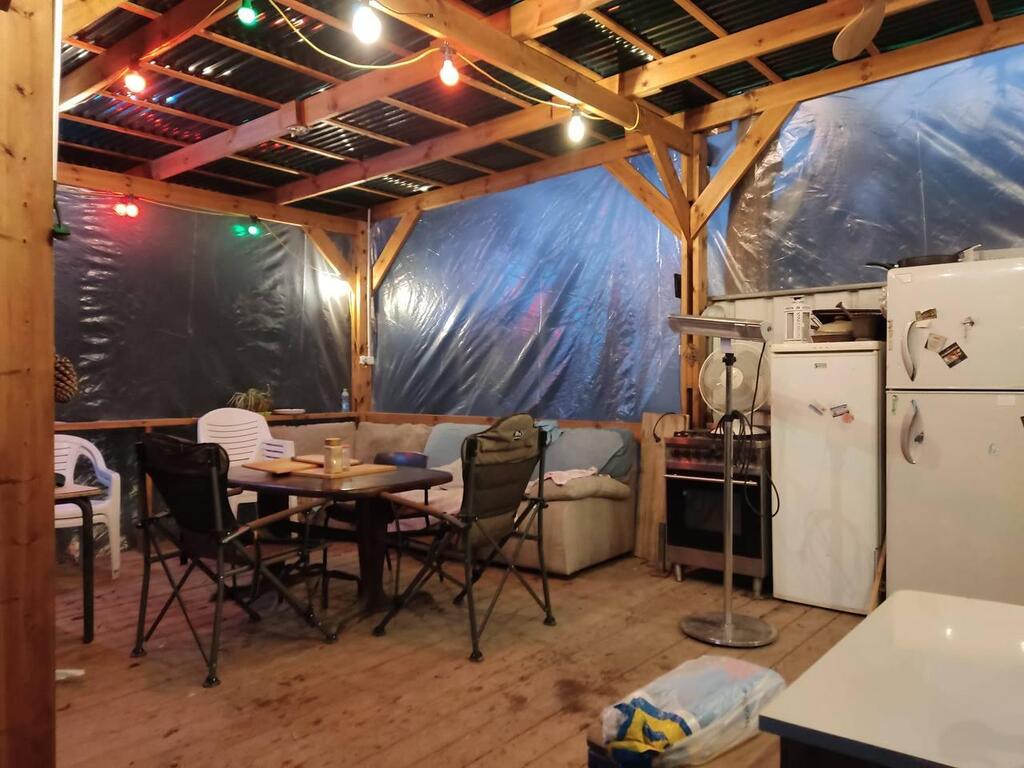

Ayelet Cohen is back home and is documenting the positive moments
(Photo: Ayelet Cohen)
They can't explain why the Hamas terrorists ignored their house, which remained standing. After long hours in the shelter, on Sunday at 11:00 a.m. they were rescued by the IDF. "We went to my sister in the north," Schnurman recalled. "It took us days to figure out who was murdered and who was abducted, until now we are still putting the pieces together. Then, we went down to Tel Aviv, because we had to be close to the funerals. We got an apartment in the city center from a good Israeli, and after two months we came back here."
"The question that should be asked in my opinion is why only we returned, and not everyone. The State of Israel can afford for Hamas to displace citizens for more than three months? For me, this is purely ideology," Schnurman added.
"It is much easier to live in northern Greece, but here is home. You can only leave home in good times, in bad times you must be at home. We decided to return because we don't like being refugees. I understand that most of the people who spent October 7 in Kfar Aza find it difficult to return to the kibbutz. But we stayed here in all the previous exchanges, we never left home."
Despite her partner's expectations, Cohen admits that if they had children she might have spoken differently. "When you have children you are responsible for someone. Obviously, I don't expect children to deal with the things we face as adults. I don't think children should be here, at least until the end of the war. But many adults I talk to would be happy to return to Kibbutz Kfar Aza as soon as possible."
Like living on a farm in the US
The daily routine of the couple hardly includes leaving the house. "Except once a week, on Sundays, when we go to Shafiim to meet friends from the community." There isn't much work. "My wife's business exists, but the customers don't. I was working at Kibbutz Sa'ad in a plastic factory, and I hope within a week or two to start going back to work," says Shahar.
Shopping is also not very convenient to do. "Netivot was not evacuated, but in Sderot, it is a little more difficult to shop. Today I went to the butcher and the fish man who are open for a few hours for business and earn a few shekels, because the state is currently not helping people whose lives have been ruined."
7 View gallery
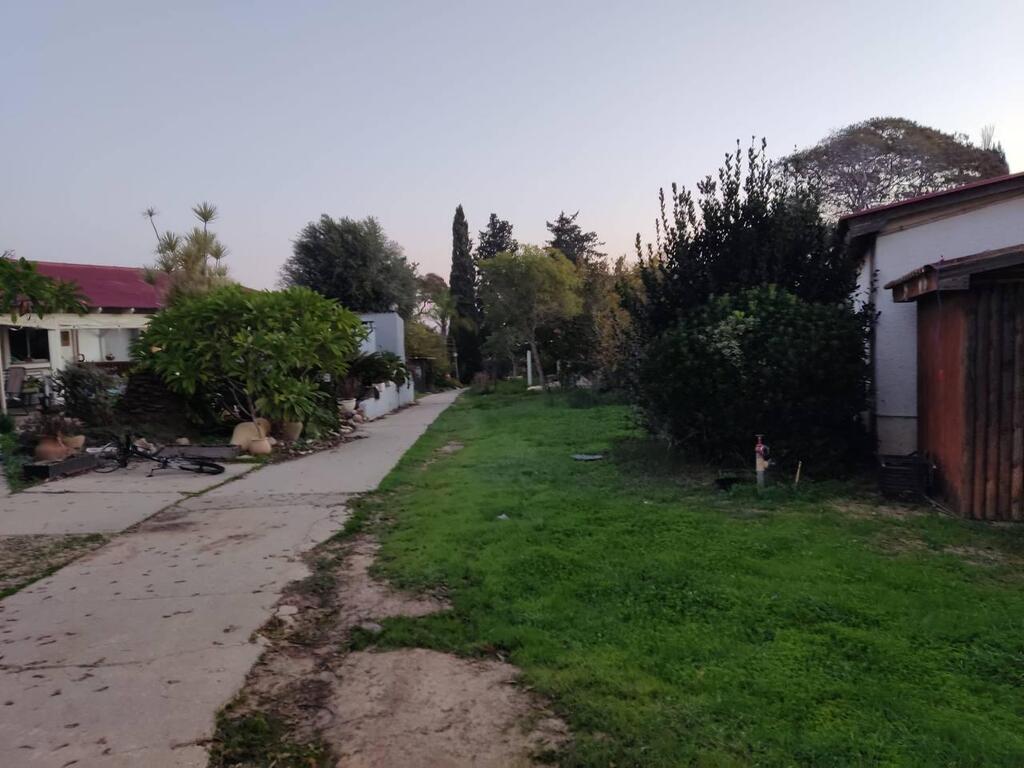

Shahar and Ayelet are the only people for miles: 'It sucks to be stuck at seven in the evening'
(Photo: Ayelet Cohen)
"The main problem right now with living in Kibbutz Kfar Aza is that there are no services that we are used to. There are no stores here, no clinic, no post office," Cohen said. "It sucks to be stuck at seven in the evening, when you planned to make dinner, without something you need. So you plan everything in advance. Every family on a farm or in a village in the U.S. has to make the same plans, we try not to let that happen to us."
In the meantime, the option of shopping online has also disappeared. "We can't receive home deliveries. We got used to shopping online, and now it doesn't exist. So it's not convenient, but we've already lived like this. I think it will be a failure for the State of Israel if in July everything here is still closed," Cohen said.
'Marigolds don't care there is a war'
A tour of Kibbutz Kfar Aza does not allow you to forget what happened here. More than 70 members of the small and close-knit community were murdered, including babies, children and the elderly. 18 members of the kibbutz were kidnapped, some of them will never return alive from Gaza.
The bodies and the blood marks were indeed removed and cleaned, but the walls of the houses are charred, their contents spilled out, the inscription "vindicated" everywhere and the bullet holes leave no room for doubt as to what happened here. Some of the residential apartments in the "Hador Hatzair" (The Young Generation) neighborhood still smell of death. "As with anything, you get used to it," Cohen said. "People do tours of Auschwitz. When you come once it's hard, when you're a tour guide, that feeling wears off. I, personally, think that these apartments should be vacated as soon as possible."
"In general, life in the kibbutz today is no different from life in the kibbutz in every round of combat. Even in the previous rounds, most of the people weren't there, it's not something we don't know," Cohen added. "The kibbutz is not really empty. I used to be able to sit on my balcony for 4-5 hours and see maybe three people pass by. Five years ago most Israelis did not know where the kibbutz was on the map, now the whole world knows that there is a place called Kfar Aza."
7 View gallery
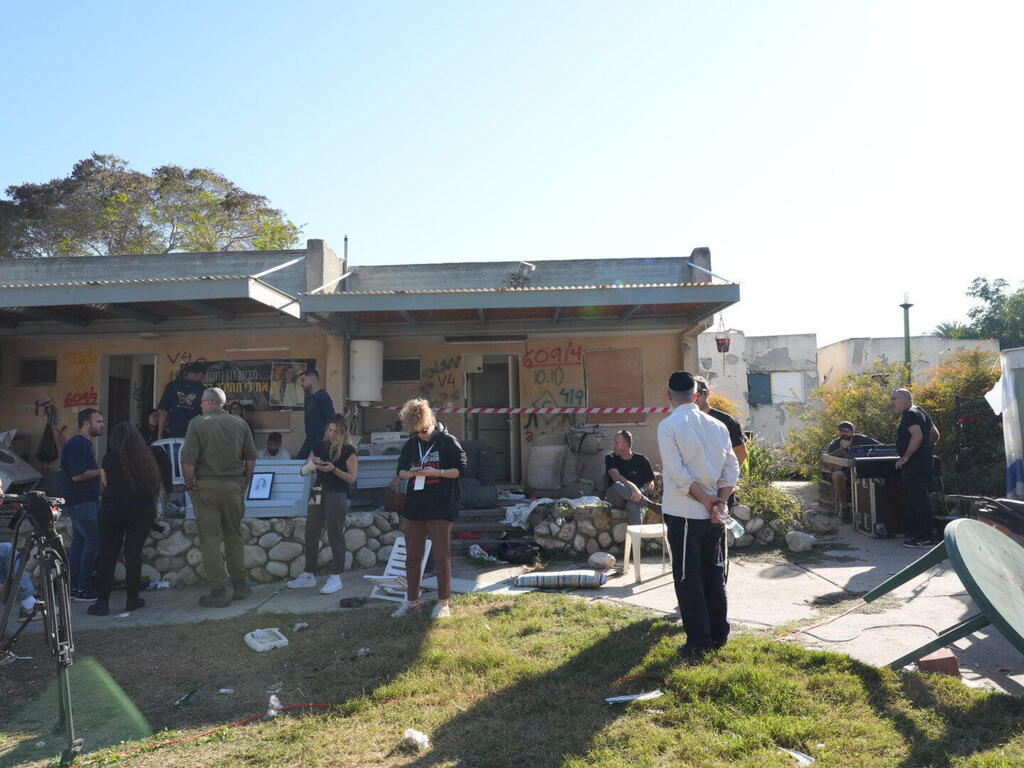

Kfar Aza receives many delegations of people who want to hear the story
(Photo: Tomer Shunem Halevi)
"When we were sitting in the shelter during the massacre, one of the things that amazed me was that for a whole night, we heard gunshots around our house, non-stop. The hours ticked by and all the time there were shots, grenade explosions and RPGs. At five in the morning I told Shahar that I don't understand how they still have ammunition," she added. "Now more and more groups come here every day, it never ends. Yesterday a Chabad delegation arrived from Brooklyn! They got off the plane and came straight to Kfar Aza. It sounds crazy to me, but if they came this far, they probably want our story."
The couple are not ready to hear about the fear of the security threat. "A few years ago I met a member of a kibbutz, it was during the time of the kite terror attacks, and she said that the kites were the scariest thing that happened to us. Of course, that's not true, bombs fell here. It won't be the scariest thing that happened to us, but just like terrorists, they managed to create a lot of fear deep in the hearts of many, many people."
Despite the difficult situation in the kibbutz, Cohen tries to maintain a positive mindset. "I want to be optimistic and believe that maybe it will be even better than it was. My friends asked me to let them know every day that I was fine, so I started a group that I called 'Good Morning Kfar Aza'. Every morning I take optimistic pictures of the kibbutz and send them.
"A few days ago we went to visit my friend's mother's house, which burned down. In the garden, there is a pot and the daffodils flowered in it. I sent her a picture and wrote to her, 'The wheat is growing again,'" she concluded. "A month from now the entire Negev will be full of marigolds, the marigolds don't care that there is a war."



